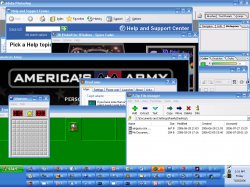exabytes18 said:
This thread inspired me to find out just how many programs I could open on my Windows XP computer. Everything went fine until I got up to the middle 40s. I suppose the computer knows it is in dire need of memory and it refused to open any more programs.
Yep, and the answer is: 15 minutes.
Windows memory management has been designed in the late 80's and has been virtually untouched since. During that time situation was that the memory resources were always lacking and reality still is that new programs need memory when they're opened - so instead of "borrowing" the memory management system from the unix, Microsoft actually tried to think of its own solution, and failed miserably.
They thought that if the user does nothing with an application for 15 minutes, the application is considered idle and its memory resources can safely be flushed to much slower virtual memory (hard disk) because nothing will be lost and the released memory can be reused by the application that is possibly being opened soon. So, therefore, most applications are stored to the disk memory and almost nothing is operated on the real memory.
Worked like a charm during the era when 16MB was a lot, and it was actually good. Only that the current memory management system is still somewhat similar, and having gigabytes of memory in a windows system is really not useful. What you did is you loaded apps into memory and faced a drastic slowdown once the system began to flush applications to the disk memory after 15 minutes of use. When that happens, hard drive is working very hard but nothing else is happening.
Coming from that, Apple has really benefited from adopting the unix base. If one adds memory to the system, it instantly adds to the performance. It works, just like other unix systems do. Linux for example, there's no difference in memory management between different unix(-like) operating systems. They rock!
risc said:
You use a computer with 256 MB of RAM? Every OS will suck with that little RAM.
Pre-OSX Macs were perfectly fine with far less than that, and Windows NT4SP3 ran very fast with 128MB. I remember when I upgraded my old 80386-based pc from 1MB to whopping 4MB when Dos 5.0 was being used. My older 8086-based laptop had whopping 512KB of memory, and the operating system (Dos 2.11) had to be booted from a 720k floppy disk.
"Every" is a dangerous word. Use it and you're "always" wrong

briand05 said:
Windows XP isn't bad overall but some programs (Windows Movie Maker, Media Center) will definitely cause crashes at times and I've had to reset the XP machine.
Actually, whenever you try to do anything media-related with Windows, you're in a deep trouble. Windows XP has been built on top of Windows NT kernel which is TERRIBLE on multimedia. Every time Microsoft has introduced new multimedia-features, they have had to break kernel a little bit more. The best NT-kernel is NT4 with service pack 3, and that's IMO the most stable and the fastest Windows ever.
But it sucks at multimedia.




